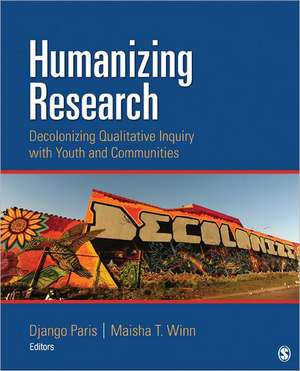Humanizing Research: Decolonizing Qualitative Inquiry With Youth and Communities
Editat de Django Paris, Maisha T. Winnen Limba Engleză Paperback – 10 apr 2013
Preț: 784.17 lei
Preț vechi: 1074.20 lei
-27% Nou
Puncte Express: 1176
Preț estimativ în valută:
150.05€ • 157.08$ • 124.16£
150.05€ • 157.08$ • 124.16£
Carte tipărită la comandă
Livrare economică 07-21 aprilie
Preluare comenzi: 021 569.72.76
Specificații
ISBN-13: 9781452225395
ISBN-10: 1452225397
Pagini: 304
Ilustrații: Illustrations
Dimensiuni: 187 x 232 x 18 mm
Greutate: 0.5 kg
Ediția:New.
Editura: SAGE Publications
Colecția Sage Publications, Inc
Locul publicării:Thousand Oaks, United States
ISBN-10: 1452225397
Pagini: 304
Ilustrații: Illustrations
Dimensiuni: 187 x 232 x 18 mm
Greutate: 0.5 kg
Ediția:New.
Editura: SAGE Publications
Colecția Sage Publications, Inc
Locul publicării:Thousand Oaks, United States
Recenzii
“The text is written in an engaging, conversational tone and presents powerful stories that will connect with students and others interested in empowering under-represented groups (focused on adolescents/youth) through community based research.”
“This text is a rich repository, covers wide variety of oppressed research participants and a must read for emerging and valuable sub-field of humanizing research within qualitative research paradigm.”
“I find it to be an overall excellent addition to the conversation on humanizing qualitative research and in general on the conversation on Critical Qualitative Research and its possible directions for development.”
“This text is a rich repository, covers wide variety of oppressed research participants and a must read for emerging and valuable sub-field of humanizing research within qualitative research paradigm.”
“I find it to be an overall excellent addition to the conversation on humanizing qualitative research and in general on the conversation on Critical Qualitative Research and its possible directions for development.”
Cuprins
Part I: Trust, Feeling, and Change: What We Learn, What We Share, What We Do
Chapter 1: Too Close to the Work/There is Nothing Right Now - Daysi Strong, Maria Duarte, Christina Gomez, Eric Meiners
Chapter 2: The Space Between: Listening and Story-ing as Foundations for Projects in Humanization (PiH) - Valerie Kinloch, Timothy San Pedro
Chapter 3: Conducting Humanizing Research with LGBTQQ Youth through Dialogic Communication, Consciousness Raising, and Action - Mollie Blackburn
Part II: Navigating Institutions and Communities as Participatory Activist Researchers: Tensions, Possibilities, and Transformations
Chapter 4: Humanizing Research in Dehumanizing Spaces: The Challenges of Conducting Participatory Action Research with Youth in Schools - Jason Irizarry, Tara Brown
Chapter 5: Activist Ethnography with Indigenous Youth--Lessons from Humanizing Research on Language and Education - Teresa L. McCarty, Leisy T. Wyman, Sheilah E. Nichols
Chapter 6: Critical Media Ethnography: Youth Media Research - Korina Jocson
Part III: The Complex Nature of Power, Relationships, and Responsibilities
Chapter 7: La Carta de Responsabilidad: The Problem of Exiting the Field - Ariana Mangual Figueroa
Chapter 8: Critical A Double-Dutch Methodology: A Kinetic Approach to Qualitative Educational Research - Keisha Green
Chapter 9: Revisiting the Keres Study: Learning from the Past to Engage Indigenous Youth, Elders and Teachers in Intergenerational Collaborative Research and Praxis - Eunice Romero-Little, Christine Sims, A-Dae Romero
Part IV: Revisiting Old Conversations toward New Approaches in Humanizing Research
Chapter 10: The Ethnographic Method in Educational Research: Why I Study Culture, and Why It Matters - David E. Kirkland
Chapter 11: Critical for Whom?: Theoretical and Methodological Dilemmas in Critical Approaches to Language Reseach - Mariana Souto-Manning
Chapter 12: R-words: Refusing Research - Eve Tuck, K. Wayne Yang
Epilogue: Reflecting Forward on Humanizing Approaches - Maisha Winn
Chapter 1: Too Close to the Work/There is Nothing Right Now - Daysi Strong, Maria Duarte, Christina Gomez, Eric Meiners
Chapter 2: The Space Between: Listening and Story-ing as Foundations for Projects in Humanization (PiH) - Valerie Kinloch, Timothy San Pedro
Chapter 3: Conducting Humanizing Research with LGBTQQ Youth through Dialogic Communication, Consciousness Raising, and Action - Mollie Blackburn
Part II: Navigating Institutions and Communities as Participatory Activist Researchers: Tensions, Possibilities, and Transformations
Chapter 4: Humanizing Research in Dehumanizing Spaces: The Challenges of Conducting Participatory Action Research with Youth in Schools - Jason Irizarry, Tara Brown
Chapter 5: Activist Ethnography with Indigenous Youth--Lessons from Humanizing Research on Language and Education - Teresa L. McCarty, Leisy T. Wyman, Sheilah E. Nichols
Chapter 6: Critical Media Ethnography: Youth Media Research - Korina Jocson
Part III: The Complex Nature of Power, Relationships, and Responsibilities
Chapter 7: La Carta de Responsabilidad: The Problem of Exiting the Field - Ariana Mangual Figueroa
Chapter 8: Critical A Double-Dutch Methodology: A Kinetic Approach to Qualitative Educational Research - Keisha Green
Chapter 9: Revisiting the Keres Study: Learning from the Past to Engage Indigenous Youth, Elders and Teachers in Intergenerational Collaborative Research and Praxis - Eunice Romero-Little, Christine Sims, A-Dae Romero
Part IV: Revisiting Old Conversations toward New Approaches in Humanizing Research
Chapter 10: The Ethnographic Method in Educational Research: Why I Study Culture, and Why It Matters - David E. Kirkland
Chapter 11: Critical for Whom?: Theoretical and Methodological Dilemmas in Critical Approaches to Language Reseach - Mariana Souto-Manning
Chapter 12: R-words: Refusing Research - Eve Tuck, K. Wayne Yang
Epilogue: Reflecting Forward on Humanizing Approaches - Maisha Winn
Descriere
Looking at what it means to conduct research for justice with youth and communities who are marginalized by systems of inequality based on race, ethnicity, sexuality, citizenship status, gender, and other categories of difference







